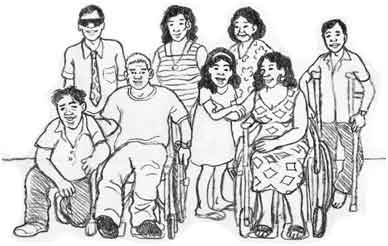Your progress
0%
complete

No community mobilization activities related to disability should be undertaken without the participation of people with disabilities. However, it is very often beneficial to involve representatives from other parts of the community in this effort as well.
A lot can be achieved when people from different parts of the community share a common goal and actively participate in both identifying needs and being part of the solution.
Learn how a community was mobilized in Colombia


In Colombia, many CBR programmes are funded and managed by local governments. In 2002, after a few years of experience, one local government realized that many of its programmes were not sustainable and lacked community ownership. To address this, it helped to establish a pilot project, FUNDISCA (Foundation of the Disabled – Caucasian), in the municipality of Caucasia.
The key objective of FUNDISCA was to facilitate the empowerment of people with disabilities by encouraging them to:
FUNDISCA mobilized many people in the community to come together and support the programme, including people with disabilities, parents, caregivers, displaced individuals, indigenous people, community members and community leaders.
FUNDISCA now has 218 members and has engaged 20 volunteers who work as CBR personnel. These CBR personnel are primarily responsible for identifying people with disabilities and providing them and their families with the necessary support. They work to promote self-esteem, family inclusion, and access to services in the health, education, labour and employment sectors.
FUNDISCA has experienced several setbacks, including:
However, with time and effort FUNDISCA has overcome these difficulties and has become a dynamic and well-established foundation. Because of its continuous community mobilization strategy, FUNDISCA has stimulated the community to become interested and involved in disability activities. It has brought people with disabilities and their communities closer together, and encouraged community leaders to become advocates for disability issues with the local authorities.